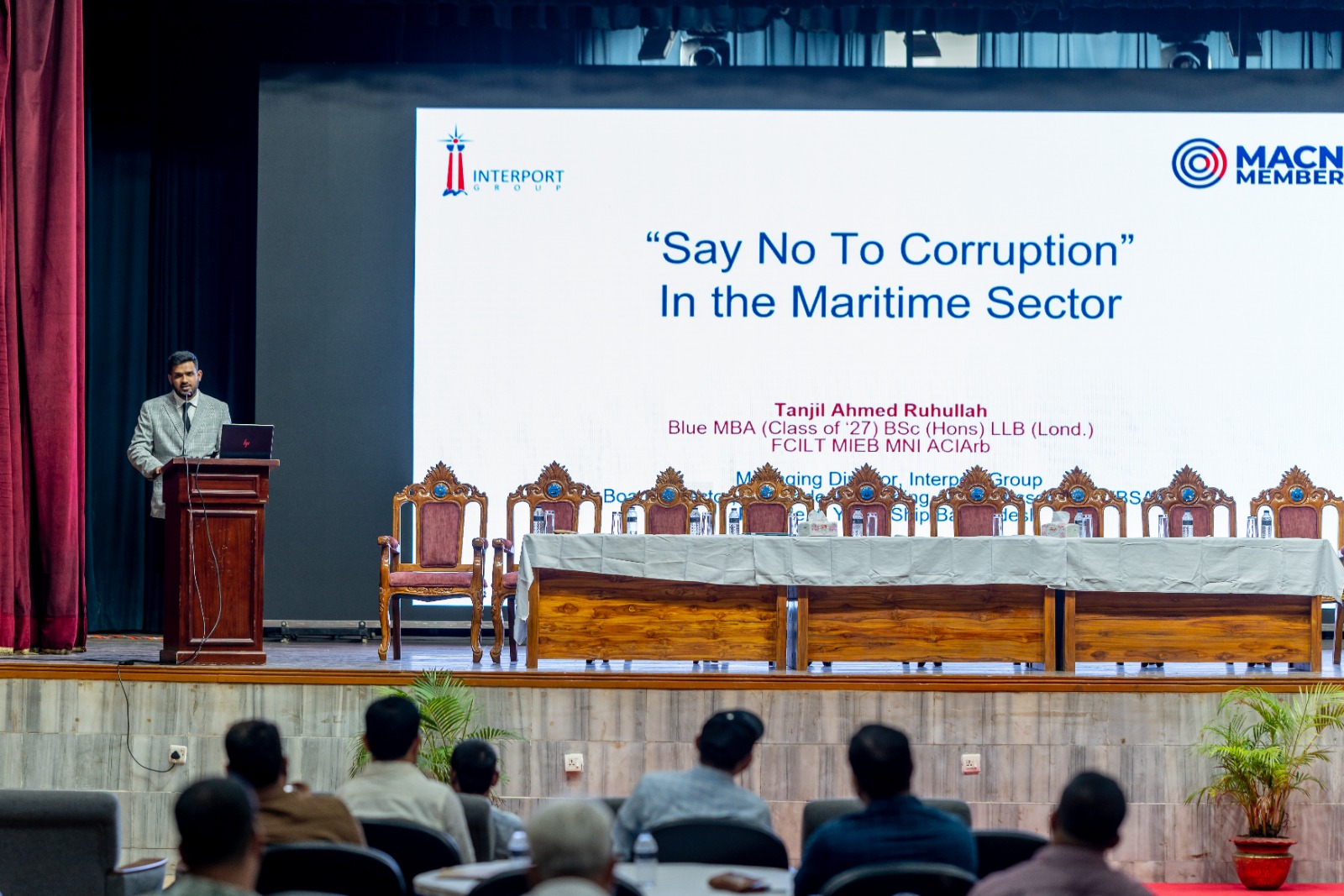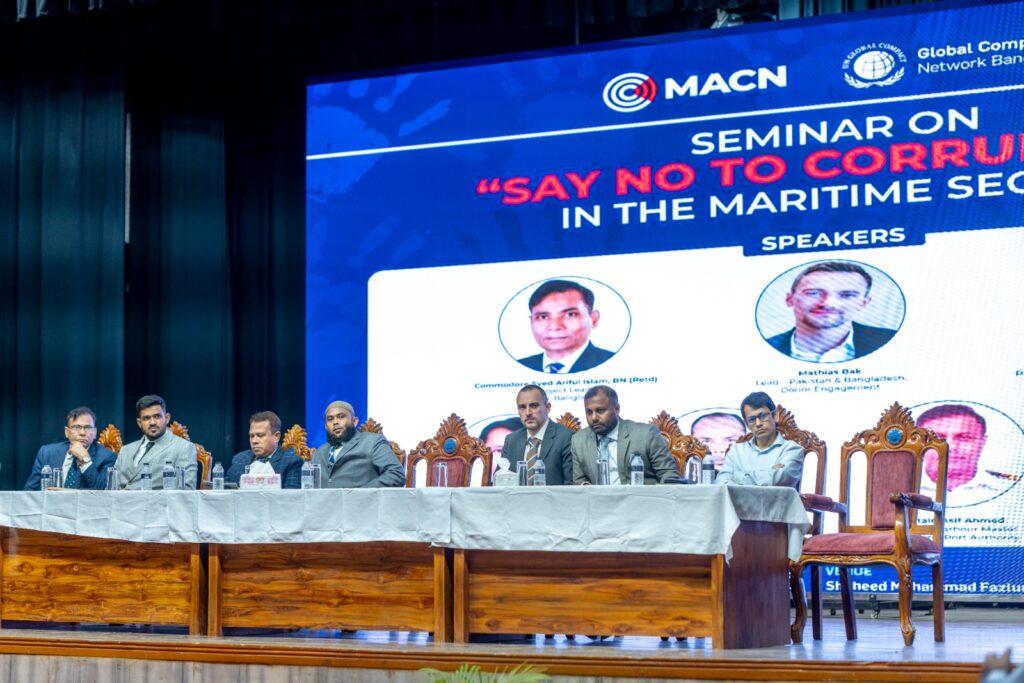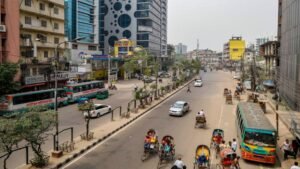Tanjil Ahmed Ruhullah Calls for Collective Action to Combat Corruption in Maritime Sector

Tanjil Ahmed Ruhullah, Managing Director of Interport Group and Board Director of the Bangladesh Shipping Agents Association (BSAA), has called for stronger collective action to eliminate corruption in Bangladesh’s maritime industry.
Speaking at a seminar titled “Say No to Corruption in the Maritime Sector,” organised by the Maritime Anti-Corruption Network (MACN) in collaboration with the UN Global Compact Network Bangladesh, Ruhullah outlined a pragmatic roadmap to promote integrity and transparency in port operations. The event, held at the Shaheed Mohammad Fazlur Rahman Munshi Auditorium of the Chittagong Port Authority (CPA) on 28 October, brought together senior government officials, port representatives, and private sector leaders.
In his paper, “From Facilitation Payments to Fair Trade: The Role of Ship Agents,” Mr. Ruhullah underscored that over 90 percent of Bangladesh’s trade depends on seaborne transport, making maritime integrity vital for national economic growth and global competitiveness.
Citing World Bank findings, he noted that corruption can increase logistics costs by up to 10 percent in developing economies, eroding profit margins and affecting trade efficiency. He warned that entrenched practices, lack of transparency, and bureaucratic overlaps continue to create opportunities for illicit payments in port processes.

Ruhullah reaffirmed Interport Group’s zero-tolerance policy against facilitation payments, explaining that while it may initially pose competitive challenges, it builds long-term trust with international principals.
Highlighting the crucial role of ship agents, Ruhullah described them as the “first line of defence” in upholding maritime integrity. He urged agents to document all transactions transparently, refuse illegal payments, and actively advocate for the digitisation of key port processes, such as the No Objection Certificate (NOC) system.
He also shared a case study from April 2024, when Interport successfully resisted an illicit demand during the delivery of critical vessel spares. The company engaged Bangladesh Shipping Agents Association (BSAA), Chittagong Port Authority, and Maritime Anti-Corruption Network (MACN) officials to resolve the issue lawfully and ensured successful delivery without paying any unofficial fees.
Mr. Ruhullah concluded that transparency, collaboration, and preparedness are essential pillars of a sustainable and ethical maritime ecosystevent.
Key industry and government figures attending the seminar included: Commodore Mahmudul Malek, Managing Director, Bangladesh Shipping Corporation, Mohammad Shafi Uddin, Commissioner, Chattogram Custom House, Senior delegates from CPA, Mercantile Marine Office, Bangladesh Shipping Agents Association (BSAA), and other inter-agency coordination bodies Project Lead of the Maritime Anti-Corruption Network (MACN) Bangladesh, Commodore Syed Ariful Islam, BN (Retd.), delivered the welcome remarks at the event.
On the occasion, he stated that although 132 to 24 incidents were recorded between 2018 and 2022, indicating improved transparency, reports of such incidents increased again in 2024.
Other presenters, including Tafsir Uddin Bhuiyan, Additional Commissioner of Customs, and officials from CPA and the Mercantile Marine Office, discussed ongoing initiatives such as the Port Community System, National Single Window, operational reforms, and specialized integrity training. These developments aim to strengthen a culture of ethical port management and enhance efficiency.
MACN South Asia Lead Mathias Bak highlighted how facilitation payments and informal charges undermine competitiveness and investor confidence. He shared successful case studies from Nigeria, India, and Argentina where MACN’s collective-action model has significantly reduced corruption while improving trade facilitation and predictability.
In their concluding remarks, organizers noted that “integrity is not a cost — it is an investment in Bangladesh’s global reputation and economic future.” They committed to further expanding grievance-reporting tools, capacity-building programs, and collaborative monitoring systems to ensure corruption-free port operations.
With this campaign now underway, Bangladesh is poised to strengthen its positioning as a reliable maritime trade hub in the region — fostering fair business practices and reducing operational inefficiencies that currently burden the logistics sector.






